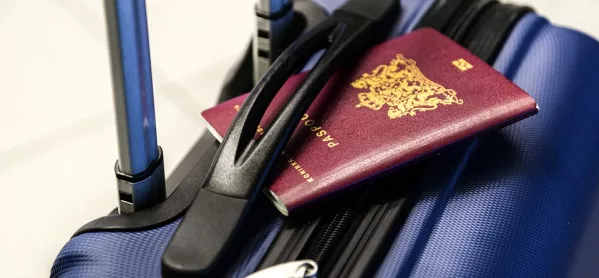What a lovely treat it was to have the education secretary’s latest brainwave shared with us between Christmas and the new year. Just as we were all feeling guilty for scoffing yet another turkey sandwich along with the last of the mince pies while watching Christmas TV, the Department for Education reminded us that we all ought to be getting more active and broadening our horizons. It launched the activity passport.
In many ways, as teachers, we ought to have been pleased to see the department talking about something other than exam results, and yet somehow it manages to get things so wrong. For a start, yet again publishing things in the holidays - clearly showing that the announcement was far more about positive press attention that about anything for schools’ benefits.
Then there’s the fact that it’s just other people’s work dressed up with a DfE logo. I suppose, at least, a school got some credit, although it’s noticeable that no mention of it is made on the finished product.
I think it’s absolutely great that St Werburgh’s Primary School in Bristol has been willing to share its work, although I can’t help but wonder whether its intentions were the same as the department’s. St Werburghs refers to its lists as “products” - they are clearly the intended outcomes of their curriculum at various stages; the DfE seems to have inadvertently turned it into an “add-on”.
Activity passports won’t add anything
Of course, the DfE has had to make some tweaks along the way. A school in Bristol understandably wants children to travel on a boat; perhaps the department felt that it couldn’t justify that for those slightly further from water, yet somehow going into a cave still made the cut! And it soon got rid of the opportunity to experience a Victorian schoolroom (after all, Victorians have been stripped from the primary curriculum - more’s the pity!).
My particular favourite change is one of importance to the political classes, I guess. St Werburgh’s encourages its pupils to go on a demonstration or start a campaign in Year 6. For some reason, the DfE has replaced this with the more mundane “learn how to access the news”. Protesting and campaigning are clearly not the done thing from Westminster’s point of view.
In truth, many primary schools already offer many of these experiences and more. The fact that they haven’t turned them into a ticklist doesn’t mean they haven’t happened or that children’s experiences are any the less for it. Yet some school leaders will no doubt now feel compelled to turn their curriculum outcomes into a checklist, and track the proportions achieved.
The daft thing is, all of us would want children to benefit from a wide range of experiences. Schools all over the country already share great ideas for what children can do at home, and families already have access to lists like those produced by the National Trust or even that produced by Tes from surveying children (“100 things you should have done at school before the age of 11 - chosen by primary pupils” -although you can imagine that the DfE would struggle to get approval for printing a passport that included “laugh hysterically when someone farts”.)
If Damian Hinds had set aside some money to allow children to access some of these exciting experiences, perhaps it could have been welcomed. Goodness, if he’d just signposted people to some of the great things already happening, who would have minded?
I’m sure schools would love to see more of what others are doing. But no. The DfE, being what it is, could only take something as exciting as climbing a tree or seeing the sun rise, and turn it into administrative work. Let’s just hope it manages to avoid setting up a league table.
Michael Tidd is headteacher at Medmerry Primary School in West Sussex. He tweets @MichaelT1979




